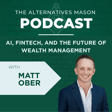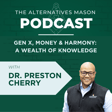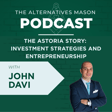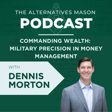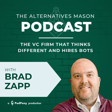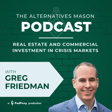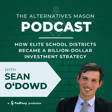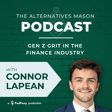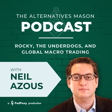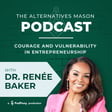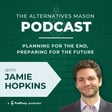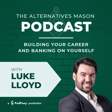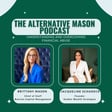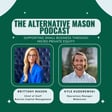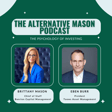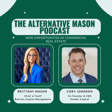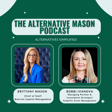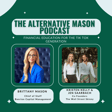Become a Creator today!Start creating today - Share your story with the world!
Start for free
00:00:00
00:00:01

The Alternatives Mason: Building Alts Knowledge Brick by Brick | Episode 21 | Leadership and Investment Trends Shaping Tomorrow with David Meyncke
In this episode, David Meyncke, Managing Director of Clough Capital Partners, shares his journey in finance. From his start at Dean Witter to leading growth and tech innovation in advisory services, he talks about the industry’s shift from commission-based to fee-based models, making investment more client-friendly. David also explains the rise of ETFs, why they’re popular, and how advisors can pick the right ones. He gives advice on leadership and teamwork, plus his thoughts on where the industry is headed with new tech, demographic shifts, and insights from leaders like Warren Buffett, Jamie Dimon, and Elon Musk.
Connect with us below!
Transcript
Introduction to Legacy and Storytelling
00:00:00
Speaker
What we're doing is going to leave a legacy for somebody. yeah and and And it could be something that's a great story. And so that's the way I think about when we go through more difficult times is you're going to write a pretty interesting story.
00:00:14
Speaker
Welcome to the Alternatives Mason podcast with host Brittany Mason, Chief of Staff at Bonner & Capital Management. You'll learn how to build alternatives knowledge brick by brick. Bonner & Capital Management uses technology to help independent advisors scale and educate themselves on alternative investments. And since education is such a big piece of what we do, we are excited to kick off the series to dive into the k nits and grits of the alternative space.
00:00:42
Speaker
Hello, everyone. It is Brittany Mason back to you again with another episode of The Alternative Mason coming to you from well, we've got not the green couch
Guest Introduction: David Meinke
00:00:53
Speaker
today. We've got the ah green screen basically in a different location today, but we are here and excited for our next guest. We have David Meinke and he is a dynamic leader in financial services, currently the managing director and head of business development at Clough Capital.
00:01:13
Speaker
With extensive expertise in advisory channel platforms, David previously led a multi-billion dollar sales team at Mainstay Funds and launched key initiatives with J and&W Stauber and Company.
David's Early Career Journey
00:01:25
Speaker
He also drove sales and product launches um for advisors and he is a graduate at Wharton Executive Education and he is a Certified Investment Management Analyst. David is committed to transforming the financial advisory landscape.
00:01:41
Speaker
So excited to have you on today, David. Thank you for joining us. How are you today? Hi, Brittany. I'm doing very well. Glad to be with you. Yeah. Yeah. Excited to get you on this podcast finally.
00:01:56
Speaker
So something I like to do on my podcast, I like to start from the very beginning. I like to really dig deep and understand, you know how did you even get in this industry in the first place? ah What was your journey into this industry and you know youre the development of your your relationship to money?
00:02:15
Speaker
So let's start from the beginning. What is your earliest memory that you have ah for your introduction to money? like is it ah Well, kind of goes back to 1982 for me. So long, long, long, long, long, long time ago. And that was the year that I became registered in this industry and became a registered rep, as we were called.
00:02:40
Speaker
um And at the time we were called stock brokers, which is an antiquated title, and that was with Dean winter, which is a firm that no longer exists ah that is now probably moved into what would be Morgan Stanley today. But Dean winter was a fairly large firm at the time.
00:03:02
Speaker
and I entered the the security and the investment business at an extremely young age. and Back then in 1982, they didn't hire young people like me and I was very young at the time. They waited till you got older before they would even think about it. but I had certain things they were looking for, and it kind of matched up really well. At the time when I started in the business in the summer of 1982, the Standard & Poor's was in the hundreds. It was it was around 700, and so kind of gone from there in in the industry and worked
00:03:38
Speaker
um and you know as a stockbroker initially, and then they started to call us different titles and different names. and I did that um for about 10 years. I was a ah financial advisor and did pretty well with it and and enjoyed it. and Then had an unusual event occur in early 1990, I got a phone call from the president of JW Seligman, which was a extremely well-known, you know, old line money management firm based out of New York. And the president had contacted me, Don Pitty, and wanted me to come up to New York and visit. And I said, well, I don't really do any meetings with
00:04:19
Speaker
mutual fund companies, so don't waste your money, Don. It's fine. I don't really do due diligence meetings with those companies, but you know I'm doing a lot of business with you. and He says, yeah, that's why you know we want you to come up. He said, but we don't want you to come up to do a due diligence meeting. We'd like you to come up to kick the tires at our company and maybe join us. I never had thought you know in a million years that I would even pursue that. I put him off for almost a year and finally did go up to New York.
00:04:49
Speaker
and And this was in 1992, and I met the people at JW Seligman. And I was just so impressed with the professionalism and the people. And then at the time, you know, Dan was talking about, you know, technology, which which I was very into as as an advisor. And they were becoming a leader in that space. It was still early days for them, but they had a money manager named Paul Wick, who is now a great an investor and money manager in the technology space. and I remember Don saying, we're going to be one of the leaders in technology, David, you can be part of it in investing side. That really attracted me to to join JW Seligman and then I entered this side of the business, which became working instead of being a financial advisor, working with financial advisors and bringing them investment product. and At that time, it was JW Seligman. so
00:05:44
Speaker
you know It was an interesting start and to to a career at a very young age that I didn't think I was going to enter. It wasn't planning on it. and Then moving to the side of the business that I'm in today, and then that progressed. and you know I got an opportunity to to run a large organization at New York Life Investment Management and Maystay Funds, and that was a fun time. and That was an extremely large team. and you know It was um you know an exciting part of my career, and then being able to back away from the rigors and and the the stress of all that, and had my time at at Alps Financial and Alps Services. And then to Cloud Capital, I've known you know Chuck Clow for 20 years, who's the head of Cloud Capital. It was just time for us to come together. So I have a big full circle um of my career and in the industry, but it spans
00:06:36
Speaker
You know, bull markets and bear markets and interest rates. I remember when when I started interest rates and money market accounts were 15%. And we've gone straight down from there. And we'll go down quite a bit more from today's 5%
Insights and Industry Changes
00:06:51
Speaker
money markets. But you know, I've gone through all of the different terms in the market over a very long period.
00:06:58
Speaker
I bet you have seen a lot and a lot of changes and how it's evolved. I mean, did you always know that this is what you wanted to, I mean, well, you didn't, you said that this is not what you always wanted to do. I mean, and it's not for everyone. So, I mean, how did you come to the space for you? Like, okay, this is it. This is what's for me. This is going to be my career. And you're, and you became, I mean, you must have became passionate about it in some sense. If you decided to then, you know, work with advisors and go into that side. yeah and so you know i had a I had an aptitude for it. I had i had you know a really good coaching ability. I've always been a good coach. and so It was a natural for me to work with financial advisors.
00:07:42
Speaker
in in just the attitude of coaching and sharing information ideas. And plus, you know, getting into the business in 1982 and just loving it. I mean, every day, even for me today, it's not work. and just You know, I love what I do every single day. And so, you know, being a student of the capital markets in the financial world,
00:08:02
Speaker
is something that's easy for me and comes natural for me. so I had an aptitude for for both areas. and um Working with you know advisors, when you think about it, it's a it's a great kind of career to have because you really become an advisor to the advisor in a sense. They're extremely impressive professionals as you know and um it's you know. I consider them institutional investors. I don't consider them anything other than that. And you know it's ah it's really great to work at that level in this business. And so you know it's it's been a career that is you know exciting, but it's fun for me. I mean, it's a career that that I've just enjoyed thoroughly every day. I love it. I love it. What is your favorite part about it? you know i I think the the thing I like best about
00:08:58
Speaker
is being able to share an idea or a thought that isn't and everyone on everyone's radar screen. you know, that everyone is doing, you know, being able to give someone an insight into investing that they say, that's helped me in this area, David, or that was impactful. And so sharing some of the insights I've been able to do, some of the ways to, you know, bring financial ideas to to their clients, and then, you know, help them understand, you know, what works in what environments and why they're important. I think kind of the
00:09:37
Speaker
you know In our industry, we always talk about it, and I know our business has become much more mechanical in that we just build these diversified portfolios. But you know everyone's looking for good ideas. Everyone still is looking for a way to improve the experience of investing, whether it's you know for their clientele, for themselves. and you know Everyone wants to find those edges and those angles of improvement. and I think that's the area I find you know most rewarding and have most of my fun in. And then fortunately I worked with firms that have been able to deliver you know products in those arenas, enough of them, to whereas you know we've been able to be, and I've been able to be, impactful for a lot of financial advisors. What do you feel is the most drastic change that you have seen in this ah specific part of the industry as far as financial ah financial advisors go?
00:10:33
Speaker
think There's two things, Brittany. that you know One was the transition from a commission-based industry to a fee-based industry. I think that's still the the biggest thing that ever happened in in the advisory business is that conversion. and That conversion took time. It it wasn't in the 80s. It really got moving in the 90s to a larger extent. and and it took a long time to build, and now it's a commonplace thing. But I think moving to a fee-based advisory system and platform for delivering the service was probably the most impactful thing in the entire industry. um no I would probably say the second thing is the advent of model portfolios, bringing you know to clientele scalable
00:11:28
Speaker
usable portfolio ideas and things that they could you know put together that could add some customization, but allow for a lot of scaling capability and I would say level setting capability of the returns and expectations that they deliver to the investment public. So i think I think that is secondary. I think that became part of just the evolution of asset management. And now it's just so accepted that we look at models and use certain models with clients. But i would I would write those two. And then if I could say there is a third because it is
00:12:07
Speaker
It's new, but it's not new because it's been around for you know almost two decades. And that is you know the movement of ETFs as as as a yeah large investment space.
00:12:21
Speaker
because it really broke the mold on the old line mutual fund problem. And that problem for a mutual fund investor was always taxation and how they could be taxed or how they will be taxed on their investment vehicle. And it was actually a flaw in the 40 Act.
00:12:39
Speaker
um that that wasn't corrected and and that created a situation where mutual fund could have all kinds of problems on taxes. you know One of the problems is you could have a lot of people liquidating that specific mutual fund for whatever reason and that fund would then have to sell securities because of that liquidation and that could create and many times they would liquidate because it wasn't working that well, let's say. and so Let's say your your account was going down, but now at the end of the year, you've got this big tax bill because the fund manager had to sell all these securities to meet those redemptions. and This was just a ah problem that should have been dealt with in the early phase of the 40 Act Fund, but it was fixed for the launch of ETFs. and ETFs have a significant tax advantage and it's still
00:13:30
Speaker
there's still a group in the advisory world that is still trying to understand and get their arms around that effectiveness of the ETF versus the traditional open and mutual fund. And I think that wave will accelerate dramatically over the next decade. Whereas if a client, if it's not a qualified account, it will probably be an ETF or an SMA.
00:13:54
Speaker
So i think that I think that is enough to be a third one I would put in. Yeah, I agree. Well, speaking of ETFs, what do you feel are the advantages of it investing you know with ETFs? It really is that the the way an ETF is created through authorized participants or what maybe would refer to as market makers in in the ETF, yeah allows for the movement of money through what's called a creation basket. And it's simply the place that all of the assets are held. And those assets being held in that creation basket allows for the movement of money to go in and out of that basket.
00:14:37
Speaker
and not inside of the investment unit itself, which is unique. So there's two things going on. There's what the money manager's doing, and and that's his own, let's say, model portfolio that he delivers to or she to the market participants who then create this basket.
00:14:59
Speaker
And then every share of stock that's moved in and out by the money managers moved in that basket. The movement of that over there to what's called the market participants creates a tremendous tax saving vehicle. Because now we can move a stock in and out and mitigate and it most times eliminate capital gains taxation for the client. Not guaranteed, but there is some examples where that format that I just mentioned could have a break to it, but we haven't seen it. And it is it is well managed even by the largest um ETF in the space, which is SPY. And since the inception of SPY, they have not paid a capital gain. which is incredible, and but that is the um benefit of what's called the creation basket of an ETF. and It's a unique structure, um but it is it does allow the movement of securities without the the tax drag on the than the client. The client's cost basis becomes the share price they pay.
00:16:09
Speaker
and and they'll have a longer short term capital gain based on how long they hold it. And it is just just one of the, you know,
00:16:20
Speaker
main features of an ETF that for any client that is concerned of of tax strike, and we all should be outside of qualified accounts, it it is a superior superior way to do business.
ETFs and Investment Strategies
00:16:34
Speaker
So it really it was this unique setup of a what we call a creation unit or basket that the securities move in and out of, and then it is done by the market participants.
00:16:48
Speaker
And i'm I'm sure you've had explanations of it many different ways. but And when we say it, some people say go over that five more times. It's true. But I mean, and then I know I have a lot of listeners that are also new to the industry. I mean,
00:17:03
Speaker
because I talk about that a lot on on this podcast. And that's why I like to always begin with, you know, what your background is and really understanding the guest and their journey, um you know, and then digging deep into other things like strategies and, you know, favorite types of funds and things like that. But um you know A lot of listeners, they I have a ah good following that has you know started learning and stuff you know now, so it's great. I'm really happy to have those new listeners over here, and so we're really all just learning together.
00:17:33
Speaker
and um but yeah so i yeah e ETFs are a great tool, and i I would love to know actually, what is your process for selecting ETFs in a portfolio?
00:17:47
Speaker
you know I think the first thing is you know you want to know you know, am I buying an index? you know What is it I'm putting in the portfolio? Am I putting an index in the portfolio? and That's the majority of ETFs are index-based or they're rules-based. Rules-based will use certain factors to build the portfolio, which is a form of an index. know and so you know there's There's what we would refer to as you know passive index and then semi-passive indexes that really act like indexes, but may look like they offer a little more jazz to them, but they certainly are indexes. and and That is still the bulk of all ETF business to this day is done through um
00:18:36
Speaker
you know an index model now now that's an active decision if you if you decide to put money in an index as an advisor or you want clients want to that's active you you make an active decision to do that and how much money you put in and indexes can be broken apart into all kinds of categories you can buy the semiconductor index instead of just you know purchasing you know the the the NASDAQ index or you know you know using a small cap index, but you could break it down into categories. So all kinds of ways to slice and dice, but you're simply buying indexes. And then the next question is, am I really purchasing an active manager?
00:19:14
Speaker
And you know our view of an active manager is somebody who who has high active share. and is you know There are active managers, and we like them. you know we we you know We think of them as valuable in the business, but they're what we call enhanced index managers. They they kind of manage around a space, and they'll move plus and minus with certain rules. And and they'll tell you, we're trying to give you, you know let's say, the large cap growth index return, and we're going to enhance that return, or we're going to give the S and&P, but we'll enhance that return. but We think that's still a form of indexing, and and it it works. and it's There's some people that do it really good and they're certainly worth putting money with, but we when we think of active, we think of higher active share. that you know The manager will will move with much greater flexibility
00:20:05
Speaker
around the capital markets that they're concentrating in or working in. That added flexibility is where then you get what you pay for if you're looking for active managers versus more passive or index-based managers. It's the way we think about it. Active is is an area that can be defined three or four different ways.
00:20:28
Speaker
um And passive is usually defined one way, but we think it's ah multiple ways that is passive. And they're all okay, you can you can mix. But there are many managers that you can find that that have high active share and are active. and they And they could add value into a portfolio that is utilizing you know more indexy type strategies.
00:20:52
Speaker
Are there any trends that you're seeing in ETFs right now or any ones that we should look out, keep an eye on? So what we what we see is.
00:21:03
Speaker
you know I think there's a couple of big trends. The one is the move for active managers to enter the space, and they're doing it in drones. You're seeing more and more active managers launching ETFs and doing ETFs. and Many times, ah they're doing that because they have an active 40-act mutual fund, traditional mutual fund, now they need an ETF.
00:21:25
Speaker
buts It's a little tricky thing to do right because you don't want to have your money leave that mutual fund and go to that ETA. you know so But they're doing that and we're seeing active as as probably the most oh you know brought to in the marketplace and ETFs is managers needing to be in it, wanting to be there as an active manager. so that I think that's the first one. We've seen a lot of fixed income. The flows you know even this year is primarily in fixed income. We're seeing all kinds of fixed income managers and more you know even passive fixed income product.
00:22:04
Speaker
coming to the marketplace, coming to the marketplace, we'll continue to see a lot of fixed income, a lot of income vehicles as we think income will continue to be ah sco a scarce commodity on the planet. We think income is going to be, it's now you know it looks like with today's money markets at 5%, 5.5%, but we think those are going to go away very, very, very quickly and you're going to be back to money markets below 2%.
00:22:30
Speaker
So income will be a hard thing to find within 24 months. And so there will be income vehicles of all sorts. um And then what's kind of more recently, and that's why we we did this at Cloud Capital, we made an acquisition in the summer um to enter the alternative space where you can bring an alternative product into the ETF marketplace. Sometimes that's tricky to do. It's not always easy to just do that, but but the way we manage money worked really well with the ETF space. I think you're seeing and we'll see a lot of alternative managers bringing their capability into the ETF category.
00:23:15
Speaker
it's emerging I think it'll become a ah large emerging category as we move through the next year, um but it's still a little bit tricky to find active alternative managers in ETFs. It's not- There's not thousands- Why is that? What is the hangout? Some of it is, it's a good question, Brittany. Some of it is the vehicles that they use, some of them are not as liquid as they would like, especially if you're doing real estate. So certain types of alternative managers, if they're utilizing real estate or investments that aren't as liquid, it becomes a problem in the ETF space. Because if you put in products that aren't as liquid, it's going to cause all kinds of problems for how that ETF will trade in the marketplace. And that has to do with is simply the spread between the bid and the ask. And if it gets too wide,
00:24:06
Speaker
The drag is too much for the client to move money in and out. So if if I have some illiquid securities and I'm putting those in an ETF, I'm creating all kinds of problems. So that limits some players from being able to utilize that vehicle, and it will continue to be that way. it's And it doesn't mean those...
00:24:24
Speaker
those products aren't good and those aren't products that you should look at. It just means it's going to be very difficult to bring those into. so You have to be a hedge fund manager that uses liquid tradable vehicles um that can be priced every second. um It's even why we limit, and for instance, in in our hedge fund vehicle, we limit the international investments to to ADRs. And the reason we do that is that they trade on the New York Stock Exchange and they trade during
00:24:59
Speaker
our business hours when the New York Stock Exchange is open. If you if you put international investments into an ETF, because markets trade at different you know time zones around the world, and they're not trading, that will cause problems for you. And so all kinds of things that affect it. So for a hedge fund manager that's doing things such as you know investing international or using short positions, um you step to the capability to borrow the stock,
00:25:29
Speaker
um and Then investing in small or mid-sized companies, there can be some restrictions on on the the availability of volume in those areas. so you know when you When you're a hedge fund manager, you can't just say, we're a hedge fund manager and we're going to offer an ETF. yeah you have to have Your process of managing money has to be liquid tradable and available during you know our hard time on the New York Stock Exchange, our hours. on the near That's the best way to do it. so That limit will limit, Brittany, a ah certain category that just will not be able to utilize ETFs.
00:26:07
Speaker
Are there any liquid types of alts that you like that we should keep an eye on as well? I think i think in the liquid alt space, you know, there's there's two areas of liquid alts. I think you can You can look at good managers that trade in future contracts that will do currency hedging, commodity vehicles. um I think they can add value and I think they can be liquid and be priced properly in the marketplace. And there are some vehicles that are coming and that are available in that space that can give you a lower correlation to the standard force 500, certainly to fixed income.
00:26:52
Speaker
I think the other category is long-short managers that are traditional. They stay in that traditional space of going long and short, and the short side of the market is a hedge and is a hedge that is not available to long-only product and is valuable for a lot of clients in dealing with volatility and also a lower correlation to the big markets, the big indices, and and even the big you know ah money managers.
00:27:20
Speaker
um Then there's a combination of manager, which we think we're in that space where we utilize both long-short capability, but also we bring other vehicles to to hedge and add performance in the portfolio, such as future contracts and options in our portfolio. so Being able to add um some additional work around the traditional long-short category is kind of what we do.
00:27:49
Speaker
There will be more of those type products that I guess is loosely defined as hedged equity managers, although that's still a tough category just to say they do what we do at Cloud Capital, because there's some people that are hedged equity managers that hedge, but they only hedge with option contracts.
00:28:08
Speaker
so That's their only hedge, they don't short stock. It's still somewhat of a loosely, ah you you can't say one of the things about the alternative space and when we start talking about hedged equity, you can't even use that as your guideline and say, I know what you do as a money manager.
Clough Capital's Unique Approach
00:28:26
Speaker
and just It just won't work. so you have to you know kind of You can't just kick the tires, you have to open the hood. yeah All of these vehicles and look and see if it's a four or eight cylinder engine because they will perform very different based on that. The names are tough. i think I think you'll see product in that hedged equity type category become more and more available and more and more you know sought after if you can find good managers in that space. Yeah. So you really, I mean, you have the due diligence is crucial. So what is your process like for that when you are deciding? The first process is to understand what is the value proposition of that money management.
00:29:16
Speaker
What is it that they're doing? you know And how do they do it? And it sounds like it's a couple of easy questions, but the answer is going to get very long. And sometimes they don't define it very well. So but you might have to probe quite a bit, but you need to understand you know what is their overall thinking? how How are they managing the risk of the market, but also the opportunity in the market? And what is their view of that? So you know understanding their foundational principle of how they're managing the money is really critical you you have to get that from them and it should be understandable it shouldn't take you that long if they do a good job it should be fairly.
00:29:59
Speaker
understandable and easy for for you to even relate to a customer or client. But that's that' the crucial step is to understand that. And I think the next thing that you need to have is, you need to know is, is it formulamatic? Is it metric based? They're active, but they have a certain set of metrics that are very hard and set. And therefore, the rules that they have don't break. There's not room for those managers or that vehicle to go outside of ah those guardrails. They keep it very tight. Then it's just a simple thing of understanding those guardrails that we talk about. And you'll be in pretty good shape. They'll stay within those guardrails. If they don't, you will know about it. You'll see variations in the portfolio.
00:30:50
Speaker
And then you have a manager that is a high active share manager and that means that they have a broader mandate and then you're gonna need to know that manager and how they change through market cycles.
00:31:03
Speaker
And so what you're getting today may not be the exact same investment vehicle two or three years from now because they're going to have a broad mandate to adjust for market cycles and market conditions. And I'll just give you an example of that. Going in to the late 90s, we all know that was a classic growth market that was Exasperated by a boom in technology and then we ended up with the dot-com boom and so all that explosion of the nineties if you were investing in a high-growth mandates with technology as a big overweight you just underperforming credible for a long period of time of the night most of the nights. When that broken shifted it became a shift towards large cap value and big multinational companies.
00:31:49
Speaker
So if your manager was just a growth manager and they stayed growth, growth, growth, growth, growth, they did great in the 90s and horrible for the next 10 years because the the market shifted and they literally didn't make you money for almost a decade. And the market went down, the growth managers you know went down, you know the market itself went down the standard reports 500 from 2003 years later, it was down 50%. And growth managers were down 70%.
00:32:16
Speaker
And so that that just going down that much means you just got to climb such a hill to break back even. And so if you didn't shift, You missed then another great cycle in the market, which was a cycle that shifted to a larger cap value cycle. And if you shifted as a manager, you did extremely well for that period. um Today, we're back in a growth cycle and in a tech cycle in the marketplace. How long will that last? We don't know. That can change. If your manager is a growth manager and is a tech manager, you'll have that even if it changes.
00:32:53
Speaker
yeah So a manager with a broad mandate that is able to change through market cycles would be very valuable as somebody that you could turn over some of the management to your client as far as managing risk and managing returns.
00:33:08
Speaker
during market changes um without you always having to mechanically make that change and do that. So you know I think that's really important to understand the manager. Is it more formula based or is it high active share? If it is, if it's high active share, you need to have a relationship with that manager.
00:33:26
Speaker
you should have you should be able to check in with the manager, whether it's a ah call that the manager does that that anyone can dial into once a quarter or once every you know periodic you know four months or twice a year, but you can check in with that manager and many times you can do other ways to to have access to the manager. We offer that at Cloud Capital to check in and make sure you understand what the strategy is in the portfolios and to stay in touch. So if you have a high active share manager, you need to stay in touch.
00:33:57
Speaker
And you need to have, you know, ways that that manager that you're working with, you need to ask, how do we stay in touch? How do we keep, how do we keep aware of what you're doing and when you make changes um as they occur? So not that complicated, not that difficult, and every most of the firms will do that. I mean, all of us will give different, you know, courtlies and things like that, but you you need to have that level of access, particularly when it's a, when it's a high active share or broad mandate manager.
00:34:25
Speaker
Yeah, I wanted to understand more about you know what sets you guys apart, what makes you unique, what makes you different. yeah so you know A cloud capital, you know we've always been a high active share manager. We've always been aware of market cycles and aware of investment opportunity changes that that will happen over long periods of time and sometimes short periods of time. and so That's been embedded in the DNA of cloud capital because the founding founding partner and and our chairman, Chuck Clow,
00:34:57
Speaker
It's a legend on Wall Street. mean Chuck was one was maybe five people in in the 80s and throughout the 90s that could move the market when they spoke. Chuck was one of those five. When when he was at Merrill Lynch with the Thundering Heard and that kind of era of asset management. um you know Chuck created many things. He he got it it was interviewed by Tom Keene at Bloomberg not too long ago. And Tom said, you we're we're really happy to have Chuck Clow on the call. And he said, Chuck is literally the person who invented equity strategy in our industry.
00:35:32
Speaker
That really really was true. Chuck was the chief investment strategist for Merrill Lynch for over 13 years. and you know That was the longest sitting person in that chair in the history of Merrill Lynch. It's not easy to sit in a chair that long if you're the chief investment strategist because you can make mistakes. It's not that easy. and you know Chuck made great calls. and you know he was able to guide you know the thousands and thousands of clients and investors and advisors at Maryland successfully through capital markets.
00:36:04
Speaker
and so that individual who was built as a as a strategist on Wall Street and someone who didn't just look at, is the market going up or down? Because we all can have that opinion. And I don't know that there's too much value in it. Being a strategist is much different. It's it's more specific. It gets down to areas like, you know you know should we be investing in technology and growth in this cycle and why? Should we be in small caps? Should we be in you know companies that are paying down their debt right now and then are converting what we call um debt to equity for an investor. And there's different ways of looking at strategy. And that's what Chuck did. He looked at strategy at a multi-level way. and And when he came and founded Cloud Capital in 2000, he brought that style of process to the firm.
00:36:56
Speaker
And so if you look at cloud capital there's two there's two things that drive our firm one is our strategic view of the capital markets what do we think is going on from a strategic standpoint and the second thing is a broad based fundamental bottom up.
00:37:12
Speaker
research, you know individual stock by stock selection process. so What does that mean? We're looking for great companies, great ideas that will work. Now, when we have a strategic view, it may drive us to certain areas and we have some of those strategic views today that are driving us to certain areas and then we pick what we think are the best companies in those arenas. um But sometimes there isn't a strategic view of certain areas. It's just a great company that we identify, and we'll have that in our portfolio. So it's really a combination of this strategic view that's been the DNA of Chuck Cloud for decades and decades and decades, and then a portfolio view, if you will, which is an individual selection ah that mirrors or
00:37:59
Speaker
kind of brings those two together. and As you blend those two together, you end up with a pretty unique investment process that is not easy to replicate. You have to have the talent on both those sides to deliver that kind of portfolio to investors and to have some of that risk awareness that you might not get if you're just focusing on individual securities um that you would see when you're focusing when you have someone or a couple of people that we do that focus more strategically.
00:38:28
Speaker
in our portfolio. So Cloud Capital is you know a high active manager with really two fundamental mandates on how we view building a portfolio and investing for clients. And you know you have an extensive expertise on the advisory channels. You've created strat you know so many different you know strategies and and everything. i'm I want to know, how would you describe your leadership style in three words?
00:38:57
Speaker
so three words. Communicate, communicate, communicate. I think so many times in the corporate setting, we get into silos because we're talented. And we can get off in in certain areas and we can crowd our thinking in to the view that we create because we're talented. And as you work with more talented people, you will find that to be the biggest challenge I have found is iss with working with executives and high-level portfolio managers is you need to make sure and then as a executive team building financial product and delivering financial products to the marketplace, that whole mechanism of doing that
00:39:49
Speaker
is based on communication so that the wheels and the and the sprockets and the gears keep turning and you don't get you don't get off track or you don't lose your connection to what made you do really well. and and Because you'll see that happen where money managers and firms will have outstanding success and then it goes bad and you're like, um how could a firm that was so successful and so good. How could they end up going so wrong? How did that happen? And I think it's when communication breaks down. I would say it's it's one word, but say it three times. And I think that's that's what what I think about constantly and in the work I've done at several companies and the work I'm doing today.
00:40:38
Speaker
I agree with you. And I think you made a really good point earlier when you said that, you know, a lot of times in this industry, we become so automated. And it's really important to remember, we're all human, you know, at the end of the day, and building those relationships are crucial, you know, to success, having compassion, having a 50, and all of that with the people, you know, that you're working with. And it's not all just a numbers game.
00:41:04
Speaker
No, it's not. And, you know, human, you know, we're humans. I mean, so well the very fact that we are, we're not mechanical, and and we do get into certain ways. in We all can become creatures of habit. And we all have personality traits that are not always lined up some of us are more outgoing some of us are um more you know passive but we're we're deep thinkers and so there's the engineer types and then there's the sales types and so you know those different personalities. um You know can can move in different directions at times in in companies.
00:41:40
Speaker
And what can happen is you'll find many times when things are starting to move in different ways, the communication starts to drift a little bit. and or Or it's not that it drifts, it just doesn't happen. so yeah It sounds like everything's fine, but you know it you're starting to miss out on that. So look, I think you know this is an industry with incredibly talented people and highly educated people.
Leadership and Building Trust
00:42:07
Speaker
And that in itself, Brittany, can create problems. yeah You can become overconfident or independent in your thinking because you are talented. Yes. So, it you know, it's very much that way. So donald did i try I've always tried to work with those professionals in helping to break down those kind of barriers that can be created in in a business, whether it's the business side of an investment firm, which is a lot of the work I do, or the investment side. it so you kind of have Think of the investment firms today, you have kind of you know the business side of it and then you have the investment side of it. and Those two worlds need to be working very closely together.
00:42:58
Speaker
um you know they They at times you know function differently, but in our industry, they are so linked that they need to be seamless and in how they operate. But it it's always a challenge. It's never going to end. It's what makes it kind of fun and exciting. But the better you commic communicate and the better you're you're promoting how to keep that going, particularly when things get a little tough.
00:43:21
Speaker
That's a great point. And how do you build trust within, amongst your team? You know, honey especially when times are tough, especially when times are tough. Yeah. And that's probably the hardest thing because being able to communicate sometimes means sending a pretty tough message, you know, and or we're sending a message that maybe doesn't want to be received. And the only way that can be done is if people trust each other.
00:43:49
Speaker
Exactly. and And then it ends, and the communication starts to end, and the value of ah all of that called brain power starts to fade away. So feeling comfortable ah with the people that you're working with, that you're able to step out and and in a professional way, but being able to communicate things that aren't always going to be the easiest to receive.
00:44:16
Speaker
without personalities and getting bruised is really difficult. It's a delicate balancing act and everyone is different. and we all have backgrounds and then you don't know what someone's currently going through or what kind of day they've had. and yeah I used to teach people that you know if you have a tough conversation, which you will have, so yes sometimes it needs to be taken off you know stage. It can't be done in a big group. It has to be done sometimes you know and in a one-on-one type situation. If you have those,
00:44:49
Speaker
conversation. It's always good to check in you know the next day and say, are we okay? Are we still friends? Are we still good? and It's just a little thing that I'm talking about people that are highly paid and highly skilled that that I've done and I've done with them and and I encourage people to do that so that that trust is built afterwards. There's not a break of that kind of you know professionalism because it sounds simple but I can't tell you how many people will be working at the same company but stop talking to certain people within that company and it hasn't happened and the communication hasn't happened for
00:45:33
Speaker
more than you would think. And so we're always going to deal with that in in our business. And it's a healthy thing to work through. But if you trust people and and you have, you know, I think humor is important and being likable is important. I think if you say something, it's a little challenging, you should say it with a smile. And it makes it a little bit easier. in Your tone and all of that. it's Yeah. So super super important. But You know, it's, it's part of what we all do, but I think you should have fun with this, you know, fun, engaging with people, fun with the people you work with. And I think that helps to deal with anytime you're going to have more challenging times. And at every company, at every level, we're always going to have those. It carries you through. It carries you through. So, you know, but it it it also makes it, you know, kind of exciting. I remember saying,
00:46:26
Speaker
to the executive group we were going through a period and we had we had to make some big changes and. They came to me and said, we need to make big changes, David, and you need to do it. So I was kind of like, oh, wow. and So yeah I kind of used humor with the group as we as we went through you know that period. But one thing I did say to them as as we were going through a period that was challenging, and it worked out. We we came through it really well. but One of the things I said to them, I said, you know, we'll look back at this and that we'll be able to tell some great stories to the newer people we bring into the firm five years from now, 10 years from now. And it'll be fun. The storybook that we're building today is kind of the history of our company. We're building a really good storybook right now. That kind of helps when you think about it from from a little different, not personal level.
Florida's Rise as a Financial Hub
00:47:22
Speaker
But what is what we're doing is going to leave a legacy for somebody. yeah and And it could be something that's a great story. And so that's the way I think about when you go through more difficult times is you're going to write a pretty interesting story. joe And kind of embrace that and enjoy it.
00:47:41
Speaker
So everything, I want to say, everything is moving to Florida, or it seems that, you know, its house florida Florida is now the Wall Street South. What do you think about those changes? How do you feel about those changes? Oh, happy. I mean, I'm not so happy when it comes to moving around the state. I mean, it's it's difficult. And it used to be great. I've been here over 35 years. And so I've seen all of it.
00:48:04
Speaker
um But it's you know it wasn't a progression we really thought would ever happen. We never thought Wall Street would come down to Florida. And we've seen it in in places like Tampa Bay. We've seen it obviously in South Florida. We've seen big money management firms. We've seen big firms come down here and they continue to do it.
00:48:22
Speaker
And it is it is fascinating. I don't think it ends, Brittany, in the next, you know, two or three or four years. I agree. It is just growing rapidly. I was asked, but what are your thoughts like bigger, you know, long term, bigger future? How do you think this is going to change?
00:48:41
Speaker
change you know the the industry in general. I mean, now people are taking more more of their meetings on yachts and stuff. I think what it does, but that's a good way to think. I think it's it's a continuation of what we all were moving to eventually anyways, which is utilizing technology.
00:49:01
Speaker
and being able to have office anywhere. And so office anywhere became you know a big thing. And of course, COVID accelerated probably a decade. really yeah And so it moved it so fast that office anywhere is now acceptable. And it's a form of of doing business. And it's not even looked upon as a weird thing. And so I think that was part of the thing where companies fell free enough to say, we can go to Florida. We don't have to stay where we've been for you know decades and decades and decades.
Future of the Financial Industry
00:49:30
Speaker
um we could we can set up there because the attitude changed. The attitude is, and it and just overall, for sure. I mean, I i lived and worked in in New York as well. And just the that the energy, obviously, I mean, it's entirely different. In New York, if you're more like, you're in more you're gonna wear a suit, you're gonna wear your nice Ferragamas. And in Florida, you're just you're it's much more laid back in meetings. And you know of course, i I agree, COVID accelerated it. and um you know And it's a nice shift in the thinking. and
00:50:04
Speaker
you know I always was marveled that I've been able to run my career mainly through Tampa, Florida. i mean i've I've been in Tampa the whole time or the area. yeahpa and I kept thinking at some point, somebody's going to tap me on the shoulder and say, you can't be here anymore, you got to go. la and you know I've had offices in New York, in New Jersey, and I have an office now in Boston, but you know the place I do most of my work is in Tampa, Florida and in Florida.
00:50:33
Speaker
And so the fact that Florida has grown and become so big is great for someone who does what I do. So that's really nice that I can kind of finish my career being in Florida. And then I think it will just it just kind of builds on it itself. The more yeah companies come down here, the more that will come down here.
00:50:51
Speaker
And the more that people are down here, if you want to get together with them, you need to be down here. Exactly. This whole location is going to keep driving more people to do it. So, you know, as that herd just keeps migrating, it becomes, you know, just a self-fulfilling, you know, prophecy. And I think that's where Florida is going to be. I think it will be much bigger five years from now.
00:51:15
Speaker
i I absolutely agree with you. I absolutely agree with you. And it makes so much sense. It's close to Latin America. There's a lot happening in Latin America. A lot of projects going on in the Dominican and Costa Rica, Panama, you know, things like that. So Miami feels like a big city.
00:51:32
Speaker
Yeah, yeah. When you're in Miami, you're in a big city. It wasn't that way. And now it absolutely is with the skyline. And when you're there, it's a vibrance of differences. I wouldn't say that with Tampa. I wouldn't say that with Orlando. I wouldn't say that with Fort Lauderdale. They're not big cities. They're not like and the rivals, some of the big cities like Chicago and New York. But Miami is becoming that. So yeah so it is it is exciting. And yes, it is the gateway to Latin America. And it's an international gateway.
00:52:02
Speaker
So um that will continue to attract more and more firms who want to be there. Palm Beach is attracting a lot of firms. We've had you know big money managers, a big name came here a few years ago. Jeffrey Gunlock brought his firm to Tampa. And so others have have done the same thing. So it will it will continue. And I'm loving this because I picked this a long time ago and it's working out just fine.
00:52:31
Speaker
But mean you know I think the other part of it, Brittany, is you know the industry that that we're in and in the financial industry. has made me the most exciting 10 or 15 years ahead of it than it's ever. And so to me, I've been in it since 82. But I think the next 10 or 15 years will be the most interesting that we've ever seen. And there's a few reasons behind that. But I absolutely think these these next 10 to 15 years, people will look back and say, wow, that was pretty cool to be part of it. So you know as long as I've been in it and so many great things that have happened,
00:53:07
Speaker
I really think these next 10 to 15 years, there's going to be some things that one is demographically is going to happen where trillions upon trillions and trillions and trillions of dollars will transfer from the baby boomers down and will create an economic boom that we've never seen before in the United States. um And I think on the technology side, not just tech, but I think with healthcare, there's going to be things that come out. and And that's going to be important for everybody in many ways. but You know, ah the financial industry will be part of all that to finance it. And and there's going to be things that are just more exciting than we can probably imagine.
Advice for Newcomers
00:53:43
Speaker
So it's a great time. I'm excited to be in this industry. and And it's been an awesome journey.
00:53:51
Speaker
yeah Do you have any advice for our listeners? Anyone that you know wants to learn more about this space? um you know Especially newbies. I know I have newbies on here. I have other people who are have been in the industry for a very long time, of course, too. but um Any resources, favorite books, podcasts, people that you like to follow? I will say there's a few people that are really important. The one is obvious, but he's a gem as long as he's with us and that's Warren Buffett. Read everything you can about him and follow him. um you know pay attention Read his his annual letter to shareholders
00:54:32
Speaker
And, you know, people think, well, yeah, it's easy, but not a lot of people do. I'm amazed at how many people don't, you know, that's wisdom that will be gone someday. And it is a national treasure. So, you know, certainly a person like him is incredibly valuable to pay attention to and to follow and to learn from.
00:54:53
Speaker
The other person that I would say is important is, and none of these people I'm going to mention are are going to be people that we think of as, you know oh, he runs money for XYZ company. So I'm not mentioning any of those. yeah um The second person that I would pay attention to, if i was no matter what level I was, certainly if I was gay in the business would be Jamie Diamond. JP Morgan is the most consequential bank on the planet.
00:55:23
Speaker
And you know he is probably the most important banker on the planet. Now, some people will get mad at me at Goldman Sachs or the Bank of America, but Jamie Dimon knows more than most people on the planet on what's going on with the capital markets, the formation of capital, how capital is going to be allocated than any other human being on the planet. And he is worth paying attention to.
00:55:47
Speaker
when he speaks to read his writings and to pay attention to Jamie, I would advise everybody to do that. um and yeah And it's hard to do to not emphasize that and enough, how important I think you know he is. I think the third person, um which may also seem obvious, but his insight is, I think, unique is Elon Musk.
00:56:13
Speaker
yeah And where he's unique is not just in what he's doing at Tesla, but how he thinks about the most important technology of our time today, which is what we're all trying to get our arms around is AI. yeah yeah Trying to understand what is this actually going to do, and how is this going to change our lives over the next 10 years? And I think he understands it better than anybody, or as well as anybody, in putting those those pieces together.
00:56:43
Speaker
Because of that, I think he's very valuable to pay attention to and to follow him, to listen what he has to say, and read what he puts out there. Because I think he is another person that is historically important in in one of the most maybe consequential things. I mean, so so if you think about how, you know, just connect these these people together, that you know warren talks about being able to identify big changes in society and investments and he's been able to do that over over decades and you know you think about that jamie diamond has talked about ai as as important as the creation or the invention of electricity that's pretty big
00:57:24
Speaker
And then Elon Musk, there was an interview that he did with a Japanese investor, and he'd probably go on YouTube and just go, Elon Musk. um I'm sorry, it was a Chinese investor. Elon Musk, Chinese investor. It was fascinating and how the Chinese investor kept talking about AI. It's not going to do this. It's not going to do that. And Elon kept saying wrong, wrong, wrong. And he then explained why it was. It was a fascinating, you know, it was done about a year and a half, two years ago. but Ever since I've kind of been watching this emerge, I think he's been one of the best teachers of it. and yeah And the person to understand it well is through his eyes. Now, there are CEOs and executives at these big firms that are that are doing this, but I think he brings a little different insight into it all. So I would say those three people,
00:58:16
Speaker
I would, I follow them and I would pay attention to, and those would be ah kind of somebody said, what are your two or three? Those are my two. Love it. Fantastic. Great advice. I really enjoyed chatting with you today, David. Thank you so much for taking the time. I loved a lot. I hope our listeners did too. Do you have any closing remarks or anything you want to leave everyone with? You know, I would just say this. I didn't, I didn't flog and I didn't want to do that with cloud capital. I wanted to leave that aside, but you know, we're, we're here to help reachable and they can reach out, you know, contact me, go to our website and, uh, you know shoot us an email and say hey let's talk we'd like to communicate with you so you know we're a firm that will be around for decades and decades from here and we have a good story to tell and we hope a story that will be you know valuable in the marketplace you know now and going forward so i would just say to people you know if you're interested let's talk.
00:59:16
Speaker
Yes, everyone. Go give David Meinke a follow on LinkedIn. You can go to their website, cloudcapital.com. And you can find us all on social media. So thank you so much for tuning in. and Thank you so much for listening. And thank you again, David. It was wonderful chatting with you. And we'll see you all next time. I enjoyed it. Thanks, Brittany.
00:59:40
Speaker
The opinions expressed in this program are for general informational purposes only and are not intended to provide specific advice or recommendations for any individual or any specific security. It is only intended to provide education about the financial industry. To determine which investments may be appropriate for you, consult your financial advisor prior to investing.
01:00:00
Speaker
Any past performance discussed during this program is no guarantee of future results. Any indices referenced for comparisons are unmanaged and cannot be invested into directly. As always, please remember, investing involves risk and possible loss of capital. Please seek advice from a licensed professional.
